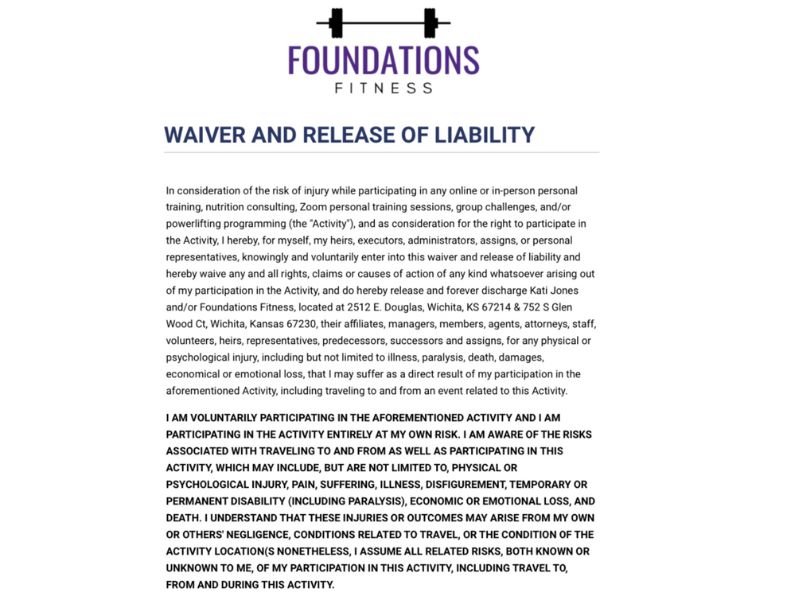As an entrepreneurial coach, your expertise and passion drive your business. However, navigating the complex landscape of liability insurance and contract management is crucial to protecting your practice and ensuring longevity.
With years of experience in the coaching industry and a Certified Strength and Conditioning Specialist (CSCS) certification, I have witnessed firsthand the challenges coaches face and the best practices that can help mitigate risks. This article will delve into the importance of liability insurance, key contract considerations, and how to structure these elements effectively.
Why Liability Insurance Matters
Liability insurance is a safety net that shields you from potential legal claims. It covers various risks, including bodily injury, property damage, and professional negligence. Without this coverage, a single lawsuit could devastate your finances and reputation.
Liability insurance covers various risks, including bodily injury, property damage, and professional negligence. Without this coverage, a single lawsuit could devastate your finances and reputation. Share on XAccording to the American Council on Exercise (ACE), 35% of personal trainers have faced legal action at some point in their careers. This statistic underscores the critical need for robust liability insurance. Legal disputes can arise from various situations, such as a client getting injured during a session, misunderstandings about the services provided, or allegations of negligence.
Types of Liability Insurance
- General Liability Insurance: Covers third-party bodily injury and property damage.
- Professional Liability Insurance: Also known as Errors and Omissions (E&O) insurance, this protects against claims of negligence or inadequate work.
- Product Liability Insurance: Essential if you sell supplements or fitness products, covering claims related to product defects or harm.
Example: Jane, a personal trainer, was sued after a client injured themselves during a session. The client was performing a box jump, but misjudged the landing and fell, resulting in a severe ankle sprain. Jane’s professional liability insurance covered the legal fees and settlement costs, saving her from financial ruin. This real-life scenario highlights the importance of having the right insurance coverage to protect against unforeseen incidents.
Choosing the Right Policy
When selecting a liability insurance policy, it’s crucial to consider the specific needs of your coaching practice. Research different insurance providers, compare coverage options, and read reviews from other coaches to ensure you choose a reliable insurer. Consult with an insurance broker who specializes in professional liability to get tailored advice and find the best policy for your business.
- Research Providers: Start by researching insurance providers that specialize in professional liability for coaches. Look for companies with good reputations and positive reviews from other coaches.
- Consult an Expert: Speak with an insurance broker who understands the unique needs of fitness professionals. They can help you find the right coverage and explain the terms of the policy.
- Compare Policies: Compare the coverage options, premiums, and exclusions of different policies. Ensure that the policy covers all the potential risks associated with your coaching practice.
Insurance Red Flags
While selecting a policy, be wary of the following red flags:
- Excessive Exclusions: Policies that exclude common risks related to your practice can leave you vulnerable. For example, if a policy excludes coverage for injuries resulting from weight training, it might not be suitable for a strength coach.
- Low Coverage Limits: Ensure the policy provides adequate coverage limits. Policies with low limits might not cover the full cost of a lawsuit, leaving you to pay out-of-pocket.
- Lack of Tail Coverage: Tail coverage extends the policy’s protection beyond its expiration date for incidents that occurred during the coverage period. Without this, you could be unprotected once the policy ends.
Contract-Based Concerns
Contracts are the backbone of your business agreements, outlining the terms and conditions of your services. A well-drafted contract can prevent misunderstandings and provide legal protection.
Crafting Effective Contracts
I spoke with Anna Kate Tillison, a personal trainer, who emphasizes the importance of clear, concise contracts: “Within your contract, it’s crucial to outline every facet of the training arrangement, encompassing session schedules, financial terms, and protocols for cancellations.”
A comprehensive contract not only sets expectations but also protects both parties in case of disputes. It serves as a legal document that can be referred to if any issues arise, ensuring that both the coach and the client understand their rights and responsibilities.
A comprehensive contract not only sets expectations but also protects both parties in case of disputes, says @trayner_dave. Share on X
Key Elements of a Coaching Contract
- Scope of Services: Clearly define what services you will provide. Be specific about the types of training, the duration of each session, and any additional services such as nutritional advice or online coaching.
- Payment Terms: Outline the cost, payment schedule, and accepted payment methods. Specify if payments are due upfront, per session, or on a monthly basis, and include any late payment penalties.
- Cancellation Policy: Specify the notice period required for cancellations and any associated fees. This helps manage your schedule effectively and ensures clients are aware of the consequences of last-minute cancellations.
- Liability Waiver: Include a clause that limits your liability for injuries or other issues. This waiver should clearly state the risks involved in the training and that the client agrees to participate at their own risk.
- Confidentiality Agreement: Protects sensitive client information. Ensure that personal data, progress records, and any private information shared during sessions are kept confidential.
Kate Jones, a strength coach and gym owner, includes a detailed liability waiver in her contracts, ensuring clients understand the risks involved and agree not to hold her liable for injuries sustained during training sessions. This proactive approach helps protect her business while maintaining transparency with her clients.

Drafting Your First Contract
- Use Templates: Start with a standard contract template designed for coaches. Customize it to fit your specific services and business model.
- Legal Review: Have a lawyer review your contract to ensure it complies with local laws and effectively protects your interests.
- Client Communication: Clearly communicate the terms of the contract to your clients. Ensure they understand all clauses, especially those related to cancellations, payments, and liability.
Integrating Research and Coaching Insights
Staying informed about industry trends and legal requirements is essential. Regularly review publications such as the Journal of Strength and Conditioning Research and attend industry seminars to keep your knowledge up-to-date. This ongoing education helps you stay ahead of potential legal issues and provides the latest best practices for your coaching business.

For example, research from the Journal of Strength and Conditioning Research highlights the increasing importance of virtual coaching and the associated legal implications. Understanding these trends allows you to adapt your contracts and insurance policies accordingly.
Voices from the Field
Learning from experienced coaches can provide valuable insights into best practices. For instance, John Galloup, owner of LVL WOD gym, advises: “Consistently revisiting and refining your contractual agreements and insurance coverage can serve as a proactive measure against unforeseen legal complications.”
Networking with other coaches and participating in professional forums can also offer practical advice and shared experiences. This peer support is invaluable in navigating the complexities of liability insurance and contract management.
Networking with other coaches and participating in professional forums can offer practical advice and shared experiences—this peer support is invaluable in navigating the complexities of liability insurance and contract management. Share on XWrap-Up
Navigating the realms of liability insurance and contract management is vital for entrepreneurial coaches. By understanding the importance of insurance, crafting thorough contracts, and staying informed through research and peer insights, you can protect your business and focus on delivering exceptional coaching services.
Ensure your practice is secure. Review your insurance coverage and update your contracts today!
Since you’re here…
…we have a small favor to ask. More people are reading SimpliFaster than ever, and each week we bring you compelling content from coaches, sport scientists, and physiotherapists who are devoted to building better athletes. Please take a moment to share the articles on social media, engage the authors with questions and comments below, and link to articles when appropriate if you have a blog or participate on forums of related topics. — SF





